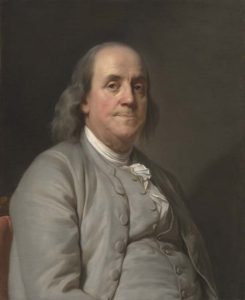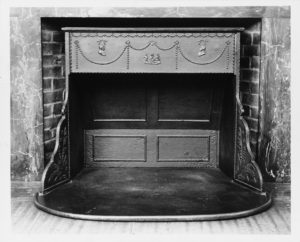Benjamin Franklin was a lot of things—inventor, publisher, scientist, diplomat, framer of the Declaration of Independence. But, some argue, he was also America’s first environmentalist. You be the judge.
Franklin was born on January 17, 1706 (died 1790). He had little formal education, but learned wherever he went. As an apprentice printer, he learned the business and became a successful publisher in Philadelphia. He eventually published Poor Richard’s Almanack, filled with pithy quotes and also with astute observations about weather, forests, farms and oceans (Exhibit 1, a fundamental interest in his environment).

As he prospered, he became a leading citizen of Philadelphia. By the time he was 42, he was wealthy enough to retire and focus on civic matters, science and inventing. Most famous for his experiments with electricity, he also studied meteorology and the ocean (Exhibit 2, a natural history interest). His study of the Gulf Stream provided navigators a new strategy for crossing the Atlantic, cutting two weeks off the round-trip.
He is well known for his interest in energy conservation (Exhibit 3). His invention of the Franklin stove provided more heat while using less fuel. He also promoted improved chimneys to reduce exposure to smoke within homes. He invented a four-sided street lamp to replace the spherical lamps that were common. Spherical lamps had poor air circulation that caused inefficient burning of the oil fuel, leading to soot on the lamps that needed to be cleaned daily and excessive smoke emitted into the air—another contribution to energy conservation and air quality.
To be the nation’s first environmentalist, a person should have an interest in the most fundamental of natural resources—water. One of his most famous aphorisms is “When the well is dry, we know the value of water.” Franklin knew the value of clean water and the need for society to protect its purity. In 1739, along with a group of fellow citizens, he petitioned the Pennsylvania Assembly to stop tanneries from dumping their wastes into public water supplies, asserting the rights of the public over excessive private actions (Exhibit 4, a commitment to public health). They won their appeal, but, alas, a lack of enforcement allowed the pollution to continue.

In the 1760s, he led a commission in Philadelphia to improve waste collection and reduce water pollution (Exhibit 5, a willingness to perform public service for environmental matters). Even more generously, he left a substantial amount in his will to build a pipeline to bring clean water into central Philadelphia. That project led to the creation of the Philadelphia Water Commission.
He didn’t get everything right, but he was sure trying. For example, while living in England and representing the Philadelphia colony during 1757-1775, Franklin encouraged England to switch fuel to improve the environment. Forests had largely disappeared in England, due to their overharvest for all manner of use, including burning as fuel. Franklin promoted the use of coal as a substitute fuel, a dubious strategy today, but then one advanced to save the endangered forest (Exhibit 6, an understanding of biodiversity conservation).
So, is the case convincing that Benjamin Franklin was America’s first environmentalist? Perhaps not the first, but surely one of them. More than anything, I believe Frnaklin’s interest in the environment shows that men and women of thought and conscience, today and yesterday, include a healthy environment among our most important and cherished priorities.
References:
Fabricius, Karl. 2008. Environmentalism in 1739. Scribol.com. Available at: http://scribol.com/anthropology-and-history/cultures/environmentalism-in-1739/. Accessed January 17,2018.
History.com. Benjamin Franklin. Available at: http://www.history.com/topics/american-revolution/benjamin-franklin. Accessed January 17, 2018.
Simenauer, Lauren. 2011. What Would Ben Franklin Do? Influences of America’s First Environmentalist. Science Progress, November 20, 2011. Available at: https://scienceprogress.org/2011/11/what-would-ben-franklin-do/. Accessed January 17, 2018.
